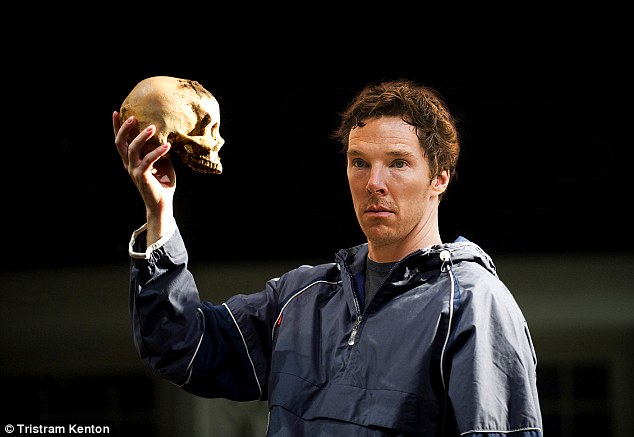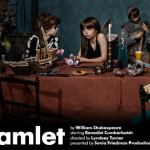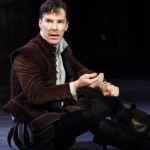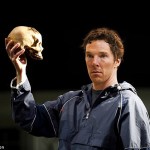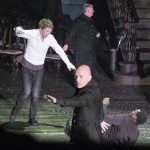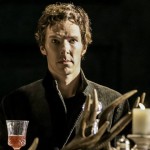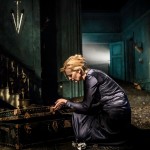“There is nothing either good or bad, but thinking makes it so” – Hamlet, Act 2 Scene II
I’ve seen Hamlets aplenty, not least when I was researching to play the Dane himself, and long since came to the conclusion that I adore the play and the myriad of interpretations it has spawned, especially post-Olivier. Not that they are equally successful, but this play demonstrates the vigour and verve of a thriving and innovative British theatre – and if ever a play was worth repeating, this is the one – and as this article points out, it is the ultimate challenge:
“Here’s the rub. No one can settle what Hamlet is about. The play thought for years to be about indecisiveness is itself the subject of indecision. In 18 years as the Observer’s theatre critic I have totted up 24 productions – although I may have forgotten a couple. Some are barely recognisable as the same play. Under the influence of a determined director or a firebrand actor, the play can become – with equal conviction – a revenge tragedy, an Oedipal drama, a study of insanity, the portrait of a fatal flaw or of a molten genius.”
That is the point really – you could not carry on repeating the same classic style time and again; each director and cast brings fresh ideas and reads more into the immortal lines. If anything, the impact has been greater transparency of meaning each time, and in turn the play has impacted on the cast. From any actor’s perspective this heaps immense pressure on their shoulders, as if playing the vast and complex role of the Dane was not enough.
I saw Daniel Day-Lewis play Hamlet not long before he suffered a breakdown and had to withdraw; the actor has since denied that he literally saw the ghost of his dead father during the show, but you can see why that myth might spring up (see here.) Alas, I didn’t see the David Tennant interpretation on stage, though I have the DVD of the RSC‘s production.
Not that long ago I attended the live cinematic experience of Rory Kinnear‘s Hamlet from the National, and blow me, here we are again – another Hamlet from the National, viewed in the comfort of Cineworld in Braintree – but only because tickets of the first night and every night thereafter had long since changed hands. What was the attraction, I hear you ask? The debut as the Dane of the ubiquitous Benedict Cumberbatch, an actor so voguish that he would earn rave reviews for deathlessly intoning the football results, that’s what!
The other ways to differentiate performance are of course to change the script and setting, since almost nobody does the full script (running time 5 hours plus), and rarely a classical Elsinore castle.
In this case we dispense entirely with the opening scene on the ramparts and instead cut to Hamlet playing records on an old-fashioned phonograph. The song being played is Nat King Cole’s version of Nature Boy, which seems to be an occasional running theme in the soundtrack, leading us to presume that Hamlet the Dane is “a very strange enchanted boy.”
Other snips at later points are slightly unfortunate. I missed a few of the comic interludes – Hamlet’s humiliation of Osric and Polonius boring a fidgety Reynaldo for example – but on the whole the pruning down to a manageable 3 hours is done with common sense by bright young director Lyndsey Turner – even if the duel is shorter than many.
What to make of Es Devlin‘s Elsinore is a slightly different question, but I know Edgar Alan Poe would have approved. Darkly lit, filled with shadows and richly dressed with all manner of spooky props and costumes ranging from grand frocks with elaborate jewellery, military uniforms and tweed three piece suits, it reminded me of nothing so much as a gothic Hammer Horror film set. This is also a running theme, apt given that Hamlet is morphed from a not-so-mad scientist turning Jekyll to Hyde… but more on the Dane shortly.
The vast set contains a fine balcony, a grand set of stairs (perfect for casting long shadows), a chandelier, and many corridors and doors; the walls are festooned with dusty pictures, animal trophies and much more. The furniture is solid, antique, very much like a horror movie come to life. Even the Players’ stage is a mini-proscenium arch (which doubles as the arras, through which Polonius is killed – “how now, a rat?”) fashioned from good old hardwood.
On occasions the doors bang open and the elements burst in – wind, lights and flurries of leaves. The ghost scene is merely a dimmed and befogged outpost of the set, skilfully lit to eerie effect (and credit too to veteran actor Karl Johnson for making such a fine job of that role, and for popping up later as a chirpy gravedigger.)
There were occasions when the set became a tad irritating and you wished Turner had adopted a less-is-more philosophy, particularly with Hamlet in his feigned madness playing with a super-sized mock castle and life-sized wooden soldiers, a nod to the original design of Elsinore, perhaps?
It was one of a number of distractions on the set, which worked best when the background was dimmed out and attention focused on the acting – as when Hamlet jumps up and over the grand dinner table to deliver the “too too solid flesh” soliloquy, while the remaining participants continue their socialising in slow motion behind him. Clearly his thought processes move apace!
In the second half Elsinore is covered in a ton and a half of soil, which helps in the grave digging scene, particularly where the procession bearing Ophelia’s enshrouded bier comes down through the mist – very effective. It made me wonder if this was a metaphor on the mouldering of a once great dynasty – returning to nature under the auspices of the evil Claudius.
Talking of Claudius, Ciarán Hinds does his level best to expose and articulate the villainy, but the embittered self-disgust in his soliloquy did not convince me in the same way that, for example, Patrick Stewart speaks the words “O, my offence is rank, it smells to heaven” like a man not so much wallowing in his own filthy corruption as vomiting it up (see here.) This leads me to wonder if Claudius does not really believe his words – maybe he thinks he is the hero and is in denial? This notwithstanding, Hinds is a fine actor, one of substance; he makes the part his own with devilish intent.
But it’s the iconic Cumberbatch you want to know about, isn’t it? He who attracts followers known as “Cumberbitches” – even though the actor himself does not approve of such a depiction. I didn’t see any knickers thrown at the stage, but I did see an actor of some presence and fortitude coolly reasoning with himself on the best options ahead. Not a Hamlet plunged into grief or on the parapets plunging into the chasm of genuine madness, but play acting with relish.
In essence, he is more Dr Jekyll than Mr Hyde, even though at extremis he does indeed “put an antic disposition on.” However, at no point has he lost control of his faculties, still less able to release his locked emotions to demonstrate true love for Ophelia, still less giving you the impression of contemplating suicide during “To be or not to be.”
This is an intelligently crafted Dane, beautifully enunciated and calmly calculating. Perhaps not quite so given to ridicule and humiliating his courtiers and friends as some, but holds his own counsel with a touch of help from the ghost of his father. “Look you, mock him not,” says Hamlet lightly to the Player King, but in this case means it.
True, he gives his mother a good telling off in the bedroom scene but chooses not to trash her in the way some Danes might have done. “O Hamlet, thou hast cleft my heart in twain” says Gertrude, though I think she escaped quite lightly. There is a touch of common decency about this Dane, despite the appalling events occurring in his life.
Talking of the good queen (Anastasia Hille), she is fragile yet alluring, barely able to comprehend how she has allowed herself to be so naive and taken in by the charlatan, such that her respectability fragments before her very eyes. She is almost more like Ophelia than Gertrude, but her faith in Hamlet never dies.
Some of the acting, alas, is patchy. Siân Brooke, whose Ophelia is undoubtedly supposed to be crazed with true grief and madness, did not set the heart aflutter – in fact, I struggled at times to hear her slightly thin voice. Nor was I that convinced by Ruairi Conaghan‘s Player King, who seemed to lack the depth and resonance of the finest, not helped by his monologue being cut short.
What of my favourite character though? Being too old for the Dane himself, I’d love to play Polonius someday. This one is portrayed by Jim Norton, who I recently praised for his excellent work as Laurel in Stan. An actor capable of the gravitas of the office of his character (effectively Prime Minister of Denmark), Norton imbues Polonius with quiet dignity, worthy of respect; the character is not quite so pompous a buffoon as some, but equally fails to understand Hamlet’s raison d’être, nor does he get a handle on the needs of his own children.
One word about the wronged Laertes, here in the form of Kobna Holdbrook-Smith. Casting a black Laertes to a white Polonius and Ophelia does not matter as such, and credit to the actor for portraying the grief in a credible and tangible eloquence. It does however introduce a new dynamic into the family, so maybe it is Turner’s intention to suggest that Laertes is different, is hot-headed and independent, and indeed that Polonius is much more concerned to protect Ophelia – which would go towards explaining her grief at his unintended slaughter. Much to think about here…
In essence this is a noble production with much worthy of further thought and analysis. I don’t believe it’s the best I’ve seen, though it is accessible, sinister and clever. Neither could you sniff at Mr Cumberbatch, even if I’m not in possession of the right sexuality to fancy the pants off him. He is the centrepiece and a true presence, and I have no doubt he is being very well rewarded for delivering such a polished performance in the most demanding role, one which every worthy actor should be able to include on his CV. The question of interest is what impact this will have on his career: will he go on, like Day-Lewis, to score several Oscars?

